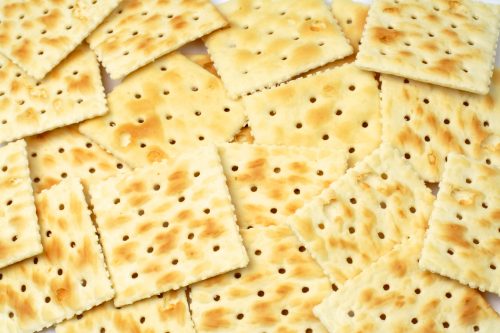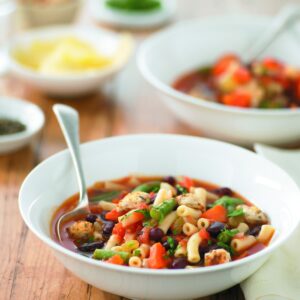
We guide you through the myriad of crackers available and help you make good choices.
What's a serve?
From the packaging, you'll see a serve of rice crackers is 14-15 crackers, water crackers are given as 1 cracker per serve, and others range from 2-6 per serve. So you may need to do some maths to understand what you're eating!
When comparing similar products it's easier to use the 'per 100g' column.
Fat
We all need fat, but it's important to understand it. Saturated and trans fats are bad for us: given the opportunity they'll clog our arteries. (Where trans fats are not listed on packs, they are included in the saturated fat amount.) Fat is also very high in energy. So, as long as it's good fat, high fat is okay for people who need to gain or struggle to maintain weight. For those of us trying to maintain or lose weight, low-fat crackers are a much better option.
Many crackers are 20-30% fat: Griffin's Snax 19.8%; Arnott's Breton 22.1%; Arnott's Cheds 27.5%; Griffin's Meal Mates (original) 27.8%. But there are also lots under 10% fat, including all the crackers we sampled.
Sodium
For good health it's recommended we limit our sodium intake to 1600mg a day. If you've been advised to reduce your sodium intake – as anyone with high or rising blood pressure will be – it's time to start reading labels.
From our sample, at the lower-sodium end of the scale: a serving of 3 Griffin's Huntley and Palmers reduced-fat crackers have 40mg sodium; 2 Arnott's Corn Cruskits have 70mg; and 2 Kavli Golden Rye Cripsbreads have 84mg.
With higher sodium levels: Griffin's Vitalife Well Grain at 400mg for 5 biscuits; Arnott's Salada Light with 367mg in 2.5 biscuits (each biscuit breaks into 4 pieces); and Fantastic rice crackers at 320mg for 14 crackers.
Whole grains
Now that we understand the health benefits of whole grains, they're even being used in crackers – although you might have to hunt for the words 'whole grain' or 'whole wheat' on some packs. Examples from our sample are Kavli Golden Rye Crispbread and Arnott's Vita-Wheat.
Fibre
Most of us could do with a lot more fibre in our diets. On average women get 18g and men 24g fibre each day, but for good health women are advised to have 28g and men 38g. Fibre content is not compulsory on nutrition information panels, but many crackers do include it.
You'll see the fibre in our sample of crackers varies widely, with Kavli a clear leader at 4.7g for a serve of 2 crispbreads. 4 Arnott's Vita-Wheat biscuits provide 2.8g fibre and 5 Griffin's Vitalife Well Grain provide 3.3g fibre, but remember your serve may well be smaller than that.
Packaging claims
- Added vitamins and minerals: If you are buying crackers as a source of vitamins and minerals, or choosing crackers on that basis, you really do need to re-evaluate your whole diet. Ignore it.
- Baked not fried: Fried food is not recommended as it tends to be very high fat (after all it's been soaking in it!) and often high in saturated fat. But who said baked foods couldn't be just as high? Compare the 'per 100g' column for these crackers with 'baked not fried' on their packaging: Griffin's Meal Mates Minis (27.8% fat, 11% saturated); and Fantastic rice crackers (a tiny 3.7% fat, 0.4% saturated). 'Baked not fried' by itself is meaningless: check the total and saturated fat content, per 100g, before you fall for that one.
- Cholesterol-free: Cholesterol only comes from animal fats and most crackers don't contain these anyway. It doesn't tell you anything in comparison to the others. Ignore it.
- Gluten-free: Helpful for people with coeliac disease. If the pack doesn't state gluten-free it can be difficult to know, even if you do look at the ingredients.
- 96% fat-free: Which means 4% fat. Good to know quickly without having to look at the nutrition information. Remember it doesn't mean that other similar products won't be lower. And of course, if it says 93% fat-free you know it has 7% fat, which may be too high for what you want.
The bottom line
When choosing crackers, think about whether they are something you or others in the house are eating regularly, or whether they're to be used as a treat (up to once a week). For regular consumption the most important criteria will be:
- Low total fat: Aim for less than 5% fat (ie less than 5g per 100g) for everyday use. For other occasions you'll still find a wide range at less than 10% fat.
- Low saturated fat: There's a whole range of crackers with less than 1% saturated fat. When looking at a particular style of cracker, go for the least saturated fat.
- Low sodium: To reduce your sodium intake, look for a realistic serving size that provides less than 160mg – that's 10% of the recommended upper daily intake – and make sure you don't have more than that serve!
It would also be ideal to include whole grains and increase your fibre intake, but your choices will be more limited.
And don't waste your efforts in finding a healthier cracker you like by topping them with wedges of high-fat cheese or scooping up huge dollops of a high-fat dip.
What are you putting on your crackers?
It's all very well finding yourself a nice low-fat, low-sodium, high-fibre cracker that won't blow the kilojoule intake, but what you put on it can make all the difference.
- 6 Rice Crackers with:
6 teaspoons hummus = 625kJ, 10.1g fat, 1.6g sat fat, 1.5g fibre, 245mg sodium
6 teaspoons cream cheese = 625kJ, 11.0g fat, 6.5g sat fat, 0g fibre, 145mg sodium - 2 Corn Cruskits with:
1/4 avocado = 550kJ, 10.6g fat, 1.6g sat fat, 2.1g fibre, 80mg sodium
2 teaspoons butter + 2 teaspoons Vegemite = 515kJ, 8.3g fat, 5.5g sat fat, 0.3g fibre, 960mg sodium - 2 Kavli Golden Rye Crispbread with:
2 tablespoons tomato salsa = 325kJ, 0.3g fat, 0g sat fat, 5.2g fibre, 85mg sodium
2 tablespoons pesto = 570kJ, 13.8g fat, 2.3g sat fat, 0.4g fibre, 70mg sodium - 3 Waterthins with:
3 teaspoons light cream cheese + 3 small slices smoked salmon (10g) = 215kJ, 2.9g fat, 1.5g sat fat, 0.1g fibre, 265mg sodium
3 tablespoons pâté = 610kJ, 13.5g fat, 3.9g sat fat, 0g fibre, 355mg sodium - 1 Salada Light (split into 4 pieces) with:
4 tablespoons light cottage cheese = 425kJ, 1.2g fat, 0.5g sat fat, 0.6g fibre, 85mg sodium
4 small wedges camembert = 610kJ, 7.2g fat, 4.4g sat fat, 0.6g fibre, 195mg sodium
www.healthyfood.com










